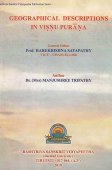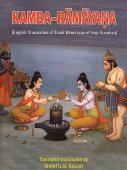Samudra, Sāmudra: 36 definitions
Introduction:
Samudra means something in Buddhism, Pali, Hinduism, Sanskrit, Jainism, Prakrit, the history of ancient India, Marathi, Hindi, biology. If you want to know the exact meaning, history, etymology or English translation of this term then check out the descriptions on this page. Add your comment or reference to a book if you want to contribute to this summary article.
Samudra has 36 English definitions available.
Languages of India and abroad
Sanskrit dictionary
[Deutsch Wörterbuch]
Source: Cologne Digital Sanskrit Dictionaries: Böhtlingk and Roth Grosses Petersburger WörterbuchSamudra (समुद्र):—
--- OR ---
Samudra (समुद्र):—2. (2. sa + mudrā) adj. (f. ā) versiegelt [Manu’s Gesetzbuch 8, 188.] [Yājñavalkya’s Gesetzbuch 2, 232.] [morgenländischen Gesellschaft 14, 571, 14.] [Mudrārākṣasa 96, 2.]
--- OR ---
Sāmudra (सामुद्र):—1. (von 1. samudra)
1) adj. a) zum Meere gehörend, daher stammend, daselbst wohnend, befindlich u.s.w. [Medinīkoṣa r. 236.] [Kauśika’s Sūtra zum Atuarvaveda 19.] Wasser [Suśruta 1, 173, 20.] [Bhāgavatapurāṇa 12, 4, 8.] Fische [Suśruta 1, 206, 5. 238, 9.] [Spr. (II) 7017.] Vögel [Mahābhārata 12, 6326.] Pferde [7, 1007.] Affen [Rāmāyaṇa 4, 38, 56. 39, 12.] Salz [Suśruta 1, 226, 17.] dravya [Varāhamihira’s Bṛhajjātaka S. 87, 23.] setu [Bhāgavatapurāṇa 10, 79, 15.] bandhu der Lakṣmī so v. a. der Mond [Kathāsaritsāgara 110, 79.] — b) Bez. eines Regenwassers von einer bestimmten Beschaffenheit, das im Monat Āśvayuja fällt, [Suśruta 1, 170, 2. 6.] [VĀGBH. 1, 5, 4.] —
2) m. a) Seefahrer [Yājñavalkya’s Gesetzbuch 2, 38.] — b) eine Mückenart (maśaka) [Suśruta 2, 290, 20.] — c) pl. Meeranwohner, Name eines best. Volkes [Rāmāyaṇa 2, 82, 7 (88, 7 Gorresio]; nach dem Comm. in der ed. Bomb. entweder samudradvīpavāsinaḥ oder potavaṇijaḥ) [Varāhamihira’s Bṛhajjātaka S. 9, 15.] [Mārkāṇḍeyapurāṇa 58, 13.] — d) patron. eines Citrasena [Mahābhārata 8, 165.] —
3) f. ī eine Tochter des Meergottes [Harivaṃśa 87.] [Bhāgavatapurāṇa 4, 24, 11.] [Viṣṇupurāṇa 85,] [Nalopākhyāna 11.] —
4) n. a) Seesalz [Amarakoṣa 2, 9, 41.] [Hemacandra’s Abhidhānacintāmaṇi 941.] [Hemacandra’s Anekārthasaṃgraha] cūrṇaiḥ [Harivaṃśa 8442.] [Suśruta 2, 329, 7. 454, 12.] — b) os Sepiae (samudraphena) [Rājanirghaṇṭa 6, 225.]
--- OR ---
Sāmudra (सामुद्र):—2. (von 2. samudra) n. ein bedeutsames Mal am Körper [Hemacandra’s Abhidhānacintāmaṇi 565.] [Hemacandra’s Anekārthasaṃgraha 3, 617. fg.] [Medinīkoṣa r. 236.] Chiromantie: vid [Varāhamihira’s Bṛhajjātaka S. 68, 1.] yātrikanimittaśataiḥ [YOGAYĀTRĀ 1, 2.] Wird auf den Personennamen Samudra von den indischen Gelehrten zurückgeführt.
--- OR ---
Samudra (समुद्र):—
1) b) samudratas [Ṛgveda 5, 55, 5.] [Z. 9 lies 5, 16. 3, 39.] —
4) [Rāmāyaṇa ed. Bomb. 4, 38, 31.]
Sanskrit, also spelled संस्कृतम् (saṃskṛtam), is an ancient language of India commonly seen as the grandmother of the Indo-European language family (even English!). Closely allied with Prakrit and Pali, Sanskrit is more exhaustive in both grammar and terms and has the most extensive collection of literature in the world, greatly surpassing its sister-languages Greek and Latin.
See also (Relevant definitions)
Partial matches: Udra, Mudra, Sha, Sam, Ca.
Starts with (+218): Samudra balli, Samudra haale, Samudra lakki, Samudra Manthan, Samudra pachha, Samudra palaka, Samudra pazham, Samudra phal, Samudra soage, Samudra soka, Samudra suri, Samudra theeradatthi, Samudra-ghosha, Samudra-muhurta, Samudra-pach-cha, Samudra-pachcha, Samudra-pazham, Samudra-sataha, Samudra-soka, Samudra-sokha.
Ends with (+89): Ajinasamudra, Ajinavarasamudra, Ajinavaravabhasasamudra, Ankushamudra, Ardhaharasamudra, Ardhaharavabhasasamudra, Ardhaharavarasamudra, Arkasamudra, Arunasamudra, Arunavaravabhasasamudra, Asamudra, Aveshamudra, Balukasamudra, Bhatta samudra, Bhavasamudra, Bhumisparshamudra, Bhutasamudra, Catuhsamudra, Dadhisamudra, Dakshinasamudra.
Full-text (+443): Samudrarasana, Samudrambara, Samudrayana, Samudranishkuta, Samudraga, Samudravahni, Samudragriha, Samudrika, Samudranavanita, Samudri, Samudratira, Samudraja, Samudranemishvara, Samudrasubhaga, Samudrasnanavidhi, Samudrayanamimamsa, Samudranemipati, Samudranta, Samudraphena, Samudraculuka.
Relevant text
Search found 97 books and stories containing Samudra, Sāmudra, Samudrā, Sam-udra, Sam-udrā, Sa-mudra; (plurals include: Samudras, Sāmudras, Samudrās, udras, udrās, mudras). You can also click to the full overview containing English textual excerpts. Below are direct links for the most relevant articles:
Rig Veda (translation and commentary) (by H. H. Wilson)
Garga Samhita (English) (by Danavir Goswami)
Chapter 20 - In the Description of the Second Fort, the Glories of Indra-tīrtha, etc. < [Canto 6 - Dvārakā-khaṇḍa]
Verse 1.11.16 < [Chapter 11 - Description of Śrī Kṛṣṇacandra’s Birth]
Verse 2.3.21 < [Chapter 3 - Description of the Yamunā’s Arrival]
Ramayana of Valmiki (by Hari Prasad Shastri)
Chapter 28 - Shuka in his turn enumerates the Enemy < [Book 6 - Yuddha-kanda]
Chapter 21 - Shri Rama prepares for departure < [Book 2 - Ayodhya-kanda]
Chapter 22 - The Army crosses the Sea < [Book 6 - Yuddha-kanda]
Kavyamimamsa of Rajasekhara (Study) (by Debabrata Barai)
Part 8.2 - Rājaśekhara’s concepts of Seven Mahādvīpas (islands) < [Chapter 5 - Analyasis and Interpretations of the Kāvyamīmāṃsā]
Appendix 2 - Identification of Geographical names mentioned in the Kāvyamīmāṃsā
Prashna Upanishad with Shankara’s Commentary (by S. Sitarama Sastri)
Verse 6.5 < [Prashna VI - The Purusha of sixteen Kalas (parts)]
Was there a Western Ocean in North India < [October – December, 2000]
“The Classical Age” < [October 1954]
Book Reviews < [April – June, 1997]
Related products
(+1 more products available)





